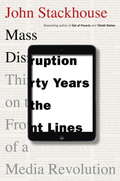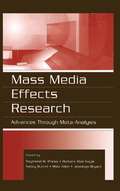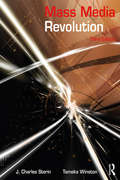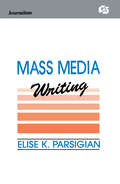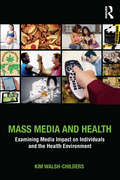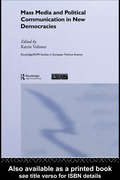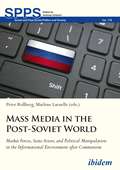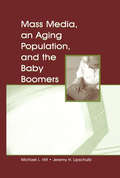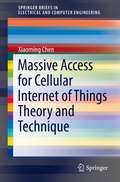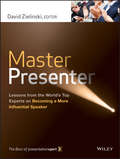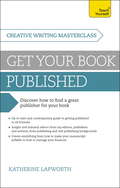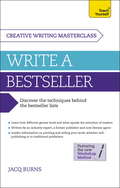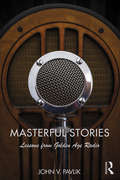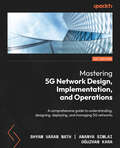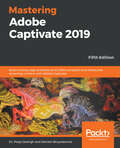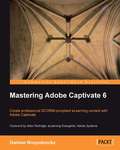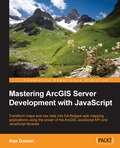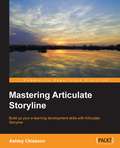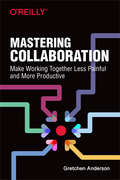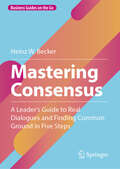- Table View
- List View
Mass Disruption
by John StackhouseDrawing on his thirty years in newspapers, the former editor-in-chief of The Globe and Mail examines the crisis of serious journalism in the digital era, and searches for ways the invaluable tradition can thrive in a radically changed future. John Stackhouse entered the newspaper business in a golden age: 1980s circulations were huge and wealthy companies lined up for the privilege of advertising in every city's best-read pages. Television and radio could never rival newspapers for hard news, analysis and opinion, and the papers' brand of serious journalism was considered a crucial part of life in a democratic country. Then came the Internet... After decades as a Globe journalist, foreign bureau chief and then editor of its Report on Business (not to mention former Scarborough delivery boy), he assumed one of the biggest jobs in Canadian journalism: The Globe and Mail's editor-in-chief. Beginning in 2009, he faced the unthinkable: the possible end of not just Canada's "national" newspaper, but the steep and steady financial decline of newspapers everywhere. A non-stop torrent of free digital content stole advertisers and devalued advertising space so quickly that newspapers struggled to finance the serious journalism that distinguished them in a world of Buzzfeed, Huffington Post, Yahoo and innumerable bloggers and citizen journalists. Meanwhile, ambitious online media aspired to the credibility of newspapers. The solution was clear, if the path to arriving at it was less so: the new school needed to meet the old school, and the future lay in undiscovered ground between them. Having led the Globe during this period of sudden and radical change, Stackhouse continues to champion the vital role of great reporting and analysis. Filled with stories from his three decades in the business, Mass Disruption tracks decisions good and bad, examines how some of the world's major newspapers--the Guardian, New York Times--are learning to cope, and lays out strategies for the future, of both newspapers and serious journalism, wherever it may live.From the Hardcover edition.
Mass Media Education in Transition: Preparing for the 21st Century (Routledge Communication Series)
by Thomas DicksonMedia educators have long been debating the nature and purpose of media education. Issues relating to new technologies and the changing state of the media industry are ongoing concerns, but some of the most difficult questions go to the actual structure of media education itself: Is it best represented as an integrated field? Should it merge with other communication subfields, or potentially split into several separate fields? Media practitioners complicate matters further by questioning the necessity for media education at all. The continued consideration of and reaction to these issues will have a significant effect on media-related education and its associated practices. In Mass Media Education in Transition, Thomas Dickson gives careful consideration to the state of media education and its future directions. He provides a history of mass media-related education as well as an overview of the major issues affecting media education at the end of the 20th century. He incorporates the visions of media education leaders as to the possible directions the field may take in the next century and includes in his discussion information that has been previously unknown or not readily available to media educators. This volume provides a broad view of the major issues affecting all aspects of media education: print and broadcast journalism, advertising, public relations, and media studies. It also offers detailed insights as to the possibilities that lie ahead as the field continues to develop--a new professionalism, or a return to a prior vision of media-related education, or possibly something quite different.
Mass Media Effects Research: Advances Through Meta-Analysis (Routledge Communication Ser.)
by Raymond W. Preiss Barbara Mae Gayle Nancy Burrell Mike Allen Jennings BryantThis distinctive collection offers a unique set of meta-analyses covering the breadth of media effects research. Editor Raymond W. Preiss and his colleagues bring together an all-star list of contributors. Organized by theories, outcomes, and mass media campaigns, the chapters included here offer important insights on what current social science re
Mass Media Revolution
by J. Charles Sterin Tameka WinstonNow in its Third Edition, Mass Media Revolution remains a dynamic guide to the world of mass media, enhancing its readers’ development as critical consumers. The text employs a storytelling narrative style and integrated, chapter-specific digital material, providing a seamless learning experience. It features a wealth of expanded content—with particular attention to diversity in the media industry, reality TV, ethics and social media, and the evolution of online journalism. Chapter content, both print and online, is aligned to the ACEJMC national academic standards. Along with student video resources, this text includes an accompanying instructor resource manual and Power Point slides. All supplementary materials can be found at massmediarev.com.
Mass Media Writing (Routledge Communication Series)
by Elise K. ParsigianThis innovative book is the first to identify and describe the systematic process that drives the day-to-day work of writers in the real world of print and broadcast journalism, public relations and advertising. The key to creative problem solution for both simple and complex assignments in media work is engagingly detailed in this thought-provoking guide. Users of this book will learn how to fulfill assignments and write copy that meets an editor's or client's expectations, speaks to the intended audience, stands up to question, and remains in memory. The author skillfully blends tested processes from science and art to equip the student with the tools of self-management and the techniques of disciplined creativity that defend against erroneous judgment. Recognizing the role of problem solving in media and the primacy of critical thinking at all stages of the writing process -- from preparatory measures to final writing -- the author challenges the assumption that discipline and creativity are incompatible partners. That partnership is described in detail, then dramatized with absorbing examples and illustrations drawn from interviews with experienced practitioners in print and broadcast journalism, public relations and advertising. Each chapter is a discovery of how this reliable partnership for solving writing problems in media applies to both anticipated and unexpected communication situations. Making known what media professionals have learned through trial and error on the job, here is a thinking and writing dynamic that students, new hires, and aspiring free-lancers can now acquire before entering the world of print or broadcast journalism, public relations or advertising.
Mass Media and Health: Examining Media Impact on Individuals and the Health Environment
by Kim Walsh-ChildersMass Media and Health: Examining Media Impact on Individuals and the Health Environment covers media health influences from a variety of angles, including the impact on individual and public health, the intentionality of these effects, and the nature of the outcomes. Author Kim Walsh-Childers helps readers understand the influence that mass media has on an individual’s health beliefs and, in turn, their behaviors. She explains how public health policy can be affected, altering the environment in which a community’s members make choices, and discusses the unintentional health effects of mass media, examining them through the strategic lens of news framing and advocacy campaigns. Written for students across a variety of disciplines, Mass Media and Health will serve as primary reading for courses examining the broader view of mass media and health impacts, as well as providing supplemental reading for courses on health communication, public health campaigns, health journalism, and media effects.
Mass Media and Political Communication in New Democracies (Routledge/ECPR Studies in European Political Science #Vol. 42)
by Katrin VoltmerThis book examines how political communication and the mass media have played a central role in the consolidation of emerging democracies around the world. Covering a broad range of political and cultural contexts, including Eastern and Southern Europe, Latin America, Asia and Africa, this new volume investigates the problems and conflicts arising in the process of establishing an independent media and competitive politics in post-autocratic societies. Considering the changing dynamic in the relationship between political actors, the media and their audience, the authors of this volume address the following issues: changing journalistic role perceptions and journalistic quality the reasons and consequences of persisting instrumentalization of the media by political actors the role of the media in election campaigns the way in which the citizens interpret political messages and the extent to which the media influence political attitudes and electoral behaviour the role of the Internet in building a democratic public sphere This book will be of great interest to all those studying and researching democracy and democratization, comparative politics, political communication, journalism, media and the Internet.
Mass Media in the Post-Soviet World: Market Forces, State Actors, and Political Manipulation in the Informational Environment after Communism (Soviet and Post-Soviet Politics and Society #178)
by Marlene Laruelle Peter RollbergThis collection covers the major trends of the media environment of the post-Communist world and their recent development, with special focus on Russia and the post-Soviet space. The term "media environment" covers not just traditional print and electronic media, but new media as well, and ranges from the political to entertainment and various artistic spheres. What role do market forces play in the process of media democratization, and how do state structures regulate, suppress, or use capitalism toward their own gain? What degree of informational pluralism has been achieved in the newly independent republics? What are the prospects for transparency and the participation of civil society in Russian and Eurasian media? To what degree do trends in post-Communist media reflect global trends? Is there a worldwide convergence with regard to both media formats and political messaging?Western observers usually pay their keenest attention to the role of media in Russia and Eurasia during national elections. While this is a valid focus, the present volume, with contributions by Luca Anceschi, Jonathan Becker, Lee B. Becker, Michael Cecire, Marta Dyczok, Nicola Ying Fry, Navbahor Imamova, Azamat Junisbai, Barbara Junisbai, Kornely Kakachia, Maria Lipman, Oleg Manaev, Marintha Miles, Olena Nikolayenko, Sarah Oates, Tamara Pataraia, Elisabeth Schimpfossl, Abdulfattoh Shafiev, Jack Snyder, Tudor Vlad, and Ilya Yablokov, aims at understanding the deeper overall media philosophies that characterize post-Soviet media systems and environments, and the type of identity formation that they are promoting.
Mass Media, An Aging Population, and the Baby Boomers (Routledge Communication Series)
by Jeremy H. Lipschultz Michael L. HiltAs the oldest members of the baby boomer generation head into their retirement years, this demographic shift is having a substantial influence on uses of mass media, as well as the images portrayed in these media. Mass Media, An Aging Population, and the Baby Boomers provides a comprehensive examination of the relationship between media and aging issues, addressing mass media theory and practice as it relates to older Americans.Reviewing current research on communication and gerontology, authors Michael Hilt and Jeremy Lipschultz focus on aging baby boomers and their experiences with television, radio, print media, entertainment, advertising and public relations, along with the Internet and new media. They draw from studies about health and sexuality to understand views of aging, and present a view of older people as important players in the political process. Hilt and Lipschultz conclude the volume by addressing trends and making predictions related to baby boomers and mass media.Providing a timely and insightful examination of the linkage between mass media and aging issues, this volume will prove a valuable resource for scholars and students in media and gerontology. It is intended for use in coursework addressing such topics as mass communication and society, media and aging, media and public opinion, sociology, and social gerontology.
Massive Access for Cellular Internet of Things Theory and Technique (SpringerBriefs in Electrical and Computer Engineering)
by Xiaoming ChenThis book focuses on massive access to the cellular internet of things (IoT). Both theory and technique are addressed, with more weight placed on the latter. This is achieved by providing in-depth studies on a number of central topics such as channel state information acquisition, user clustering, superposition coding, and successive interference cancellation. Four typical application scenarios are examined in detail, namely the stationary IoT device scenario, frequency division duplex-based low-mobility IoT device scenario, time-division duplex-based IoT device scenario, and high-mobility IoT device scenario. The comprehensive and systematic treatment of key techniques in massive access to the cellular IoT is one of the major features of the book, which is particularly suited for readers who are interested in finding practical solutions for the cellular IoT. As such, it will benefit researchers, engineers, and graduate students in the fields of information engineering, telecommunications engineering, computer engineering, etc.
Master Presenter: Lessons from the World's Top Experts on Becoming a More Influential Speaker
by David ZielinskiFor anyone who wants to become a more persuasive and tech-savvy presenter, Master Presenter offers an accessible collection of the best tips, tactics, and hard-won lessons from top presentation skill coaches who write for PresentationXpert newsletter. Designed to be a hands-on resource, the book includes advice drawn from real-world, time-starved businesspeople who create compelling presentations that get results. Now, you too can tap into the power of the little-used, but valuable features of PowerPoint® that can save time or enhance slide design and make your presentation stand out in a crowd. This groundbreaking book also includes practical advice on getting the most from mobile devices to enhance presentations and shows how to apply social media tools like Twitter to aid in delivering compelling messages. Learn how web conferencing can be used not only to reduce travel costs, but to deliver more effective informational, training or motivational presentations across time zones. In addition to putting the spotlight on the high-tech, Master Presenter contains valuable information on the critical low-tech presentation skills. Contributors show how to best use your voice, hands, and body and what it takes to move your listeners to take action when making a well-prepared pitch. And even if you are inexperienced, you can use the book's techniques to become a great storyteller that will win over audiences and help earn you a reputation as a master presenter. Praise for Master Presenter "Master Presenter arms you with the method and magic to present with poise and power. David Zielinski has assembled the best and brightest mentors to teach greatness in business presenting." —Chip R. Bell, author of Managers as Mentors "Master Presenter is the most comprehensive collection of useful articles I've ever seen in one place. After reading more than 200 books on public speaking in my lifetime and teaching the subject in eight countries, I can easily recommend this book for beginners and seasoned speakers. Great tips on PowerPoint®, for example, with dozens of articles and illustrations on all aspects of speaking by leaders in the field." —Michael Buschmohle, president, Applause Associates "As a 30-year veteran of presenting and a certified professional facilitator, I found myself reading through this book's articles and still gaining new insights into things I can do to improve my presentations. I was impressed by the perspectives shared by this top-notch team of experts. This is one of the few books I would strongly recommend to my network of customers, who are purchasers of facilitation and engagement tools." —Dr. Scott Simmerman, managing partner, Performance Management Company "I make presentations for a living and I've been doing it for a long time, but I'm keeping a copy of this book within reach on my desk at all times. I could have used it when I was starting out, but I also have learned enough over the years to recognize how valuable this book will be as an ongoing and wide-ranging resource for telling compelling stories." —Brian McDermott, co-author of Leading Innovation and Time Out for Leaders
Masterclass: Discover how to find a great publisher for your book
by Katherine LapworthLEARN HOW TO FIND A PUBLISHER AND GET YOUR BOOK PUBLISHED.Do you have a completed manuscript ready for submission?Are you looking to successfully publish or self-publish your work?Do you have the level of understanding of the publishing industry?Whether you want to take a traditional route into print or want to digitally self-publish, this book will give you the advice you need on everything from submitting manuscripts to garnering reviews and promoting your work. It covers everything from polishing a final draft to managing your finances, and is also full of case studies, advice and tips from industry insiders from both traditional publishing and successful self-publishing backgrounds.ABOUT THE SERIESThe Teach Yourself Creative Writing series helps aspiring authors tell their story. Covering a range of genres from science fiction and romantic novels, to illustrated children's books and comedy, this series is packed with advice, exercises and tips for unlocking creativity and improving your writing. And because we know how daunting the blank page can be, we set up the Just Write online community at tyjustwrite, for budding authors and successful writers to connect and share.
Masterclass: How to plan, write and publish a bestselling work of fiction
by Jacq BurnsLEARN HOW TO WRITE A BOOK WHICH STANDS OUT FROM THE CROWD.There is no precise formula for writing a bestseller, but there are secrets, skills and techniques that will dramatically improve your odds of publishing a bestselling novel.Whatever your motivation - whether sick of rejections, getting ready to approach a publisher, or with an idea you think is unbeatable - you need to read this book before you do anything else. It gives you the key insights into what makes a bestseller and explains the trends and conventions of different genres, before helping you get a real handle on the writing (and revising) process. A third of the book is devoted to pitching and selling your novel both to traditional agents and as a self-published author, with incisive and cutting-edge insights into writing for Amazon and becoming an 'authorpreneur'.ABOUT THE SERIESThe Teach Yourself Creative Writing series helps aspiring authors tell their story. Covering a range of genres from science fiction and romantic novels, to illustrated children's books and comedy, this series is packed with advice, exercises and tips for unlocking creativity and improving your writing. And because we know how daunting the blank page can be, we set up the Just Write online community at tyjustwrite, for budding authors and successful writers to connect and share.
Masterful Stories: Lessons from Golden Age Radio
by John V PavlikThe early eras of radio storytelling have entered and continue to enter the public domain in large quantities, offering unprecedented access to the Golden Age of Radio. Author and Professor John Pavlik mines the best this age of radio has to offer in Masterful Stories, an examination of the masterpieces of audio storytelling. This book provides a chronological history of the best of the best from radio’s Golden Age, outlining a core set of principles and techniques that made these radio plays enduring examples of storytelling. It suggests that, by using these techniques, stories can engage audiences emotionally and intellectually. Grounded in a historical and theoretical understanding of radio drama, this volume illuminates the foundational works that proceeded popular modern shows such as Radiolab, The Moth, and Serial. Masterful Stories will be a powerful resource in both media history courses and courses teaching audio storytelling for modern radio and other audio formats, such as podcasting. It will appeal to audio fans looking to learn about and understand the early days of radio drama.
Mastering 5G Network Design, Implementation, and Operations: A comprehensive guide to understanding, designing, deploying, and managing 5G networks
by Shyam Varan Nath Ananya Simlai Oguzhan KaraLearn 5G network design and implement advanced apps using standalone, non-standalone, and private 5G networks with expert guidance from industry leadersPurchase of the print or kindle book includes a free eBook in the PDF formatKey FeaturesGain a comprehensive understanding of the 5G end-to-end network architectureBuild a foundation to successfully design, implement, manage, and monetize a 5G networkDesign and deploy innovative applications based on 5G networksBook DescriptionWe are living in an era where ultra-fast internet speed is not a want, but a necessity. As applications continue to evolve, they demand a reliable network with low latency and high speed. With the widespread commercial adoption of driverless cars, robotic factory floors, and AR/VR-based immersive sporting events, speed and reliability are becoming more crucial than ever before. Fortunately, the power of 5G technology enables all this and much more.This book helps you understand the fundamental building blocks that enable 5G technology. You'll explore the unique aspects that make 5G capable of meeting high-quality demands, including technologies that back 5G, enhancements in the air interface, and packet core, which come together to create a network with unparalleled performance. As you advance, you'll discover how to design and implement both 5G macro and private networks, while also learning about the various design and deployment options available and which option is best suited for specific use cases. After that, you'll check out the operational and maintenance aspects of such networks and how 5G works together with fixed wireline and satellite technologies.By the end of this book, you'll understand the theoretical and practical aspects of 5G, enabling you to use it as a handbook to establish a 5G network.What you will learnUnderstand the key aspects and methodology of 5G New Radio and NG-RANGet to grips with Voice over New Radio (VoNR) networksGet started with 5G radio planning along with the 5G air interfaceTake a deep dive into the 5G core network and explore the overall 5G network architectureGain a clear understanding of various 5G deployment optionsExplore network slicing and the role it plays in 5GGet an overview of 5G fixed mobile convergence, autonomous vehicles, and satellite communicationsWho this book is forIf you are a telecom enthusiast or work in this domain and are looking to learn more about building a 5G network bottom–up or an application modernization strategy maker, then this book is for you. It provides a consumable understanding of the technology to network engineers, network architects, and infrastructure decision-makers, helping them excel in their day-to-day work involving 5G technology.
Mastering Adobe Captivate 2019: Build cutting edge professional SCORM compliant and interactive eLearning content with Adobe Captivate, 5th Edition
by Damien Bruyndonckx Dr Pooja JaisinghCreate responsive eLearning content, including quizzes, demonstrations, simulations and Virtual Reality projects that fit on any device with Adobe Captivate 2019 Key Features Build responsive, interactive and highly engaging eLearning content with Adobe Captivate 2019 Build Virtual Reality eLearning experiences with Adobe Captivate 2019 Assess your student knowledge with interactive and random quizzes Seamlessly integrate your eLearning content with any SCORM or xAPI compliant LMS Book Description Adobe Captivate is used to create highly engaging, interactive, and responsive eLearning content. This book takes you through the production of a few pieces of eLearning content, covering all the project types and workflows of Adobe Captivate. First, you will learn how to create a typical interactive Captivate project. This will give you the opportunity to review all Captivate objects and uncover the application's main tools. Then, you will use the built-in capture engine of Captivate to create an interactive software simulation and a Video Demo that can be published as an MP4 video. Then, you will approach the advanced responsive features of Captivate to create a project that can be viewed on any device. And finally, you will immerse your learners in a 360o environment by creating Virtual Reality projects of Adobe Captivate. At the end of the book, you will empower your workflow and projects with the newer and most advanced features of the application, including variables, advanced actions, JavaScript, and using Captivate 2019 with other applications. If you want to produce high quality eLearning content using a wide variety of techniques, implement eLearning in your company, enable eLearning on any device, assess the effectiveness of the learning by using extensive Quizzing features, or are simply interested in eLearning, this book has you covered! What you will learn Learn how to use the objects in Captivate to build professional eLearning content Enhance your projects by adding interactivity, animations, and more Add multimedia elements, such as audio and video, to create engaging learning experiences Use themes to craft a unique visual experience Use question slides to create SCORM-compliant quizzes that integrate seamlessly with your LMS Make your content fit any device with responsive features of Captivate Create immersive 360Рexperiences with Virtual Reality projects of Captivate 2019 Integrate Captivate with other applications (such as PowerPoint and Photoshop) to establish a professional eLearning production workflow Publish your project in a wide variety of formats including HTML5 and Flash Who this book is for If you are a teacher, instructional designer, eLearning developer, or human resources manager who wants to implement eLearning, then this book is for you. A basic knowledge of your OS is all it takes to create the next generation of responsive eLearning content.
Mastering Adobe Captivate 6
by Damien BruyndonckxThis book is a step-by-step tutorial including all the needed assets to build the three sample projects it covers. It is divided into lots of small sub-topics and follows a clear and logical outline to help you structure your new knowledge. Every single feature covered is immediately illustrated by a meaningful exercise. Self-exploration of the software is strongly encouraged through extra exercises and experimentations. The book also introduces you to the Captivate community by providing lots of external reference and tips and tricks from established e-learning professionals. If you are: A teacher wanting to produce high quality e-learning content for your students. Working in a training department and want to implement e-learning in your company. Using a SCORM or AICC-compliant LMS and want to produce e-learning content to track your students’ performance. A webmaster in need of a fun and interactive way to produce an FAQ or a support site. Interested in e-learning. Then, this book is for you! A basic knowledge of your operating system (Mac or Windows) is all it takes to author the next generation of e-learning content with this book.
Mastering ArcGIS Server Development with JavaScript
by Ken DomanTransform maps and raw data into full-fledged web mapping applications using the power of the ArcGIS JavaScript API and JavaScript libraries About This Book * Create and share modern map applications for desktops, tablets, and mobile browsers * Present and edit geographic and related data through maps, charts, graphs, and more * Learn the tools, tips, and tricks made available through the API and related libraries with examples of real-world applications Who This Book Is For This book is intended for intermediate developers who want to design web mapping applications. You should have some experience with geographic information systems, especially with ArcGIS products such as ArcGIS Server. It also helps to have some experience with HTML, CSS, and JavaScript. What You Will Learn * Create single-page mapping applications, lining up data from different sources * Search for and display geographic and tabular information based on locations and attributes * Customize maps and widgets to deliver the best user experience * Present location data intuitively using charts and graphs * Integrate mapping applications with your favorite JavaScript frameworks * Test the working of your web map application and take advantage of cloud services such as ArcGIS Online * Create modern-looking web maps through styling tips and tricks In Detail ESRI and its ArcGIS line of software have been an industry leader in digital map production and publication for over 30 years. ArcGIS Server lets you design, configure, and publish maps that can be viewed and edited through the Internet. After designing basic maps, you may want to find out new and innovative ways to represent information using these maps. In this book, you'll work through practical examples, experiencing the pitfalls and successes of creating desktop and mobile map applications for a web browser using the ArcGIS Server platform. The book begins by introducing you to ArcGIS Server and ESRI's JavaScript API. You'll work with your first web map and then move on to learn about ESRI's building blocks. A Dojo AMS style widget will help you create your own widgets for a map and then see how to collect geographic data. Furthermore, you will learn different techniques such as using Dojo Charts to create charts and graphs to represent your data. Then you will see how to use ESRI JavaScript API with other JavaScript libraries and different styling methods to make your map stand out. By the end of the book, you will discover how to make your application compatible with different devices and platforms and test it using testing libraries. Style and approach An in-depth guide that explores web application development using ArcGIS Server and the ArcGIS JavaScript API. Topics are explained in the context of developing two applications for fictional clients. Details of application development, including possible pitfalls and best practices, are included in this book.
Mastering Articulate Storyline
by Ashley ChiassonBuild up your e-learning development skills with Articulate Storyline About This Book * Develop interactive e-learning projects using advanced techniques * Impress your clients and/or audience with out-of-the-box interactions * Step-by-step walkthroughs provide practical solutions Who This Book Is For This book is for anyone experienced in using the basic functions of Articulate Storyline who are yearning to learn more. It's designed to provide a brief overview of key concepts, to help you refresh your knowledge of common functions, and teach you how to push Storyline to the limit! What You Will Learn * Familiarize yourself with best practices for e-learning development * Review key Storyline concepts before diving in deep with development * Discover new ways of working within Storyline to extend slide content and enhance interactivity * Personalize your story with advanced variable-based interactions * See how JavaScript can be used in your stories to do some really neat things * Assess your learners using customized assessment options and find out how to troubleshoot common issues * Customize the learning experience by modifying the player properties and publishing settings * Customize your story and prepare it for publishing In Detail Storyline is a powerful e-learning authoring tool that allows you to take your creativity to the next level. However, more often than not, projects don't require such complex interactions, leaving Storyline's full capabilities untapped. This book will provide you with the information you need to take your Storyline development up a notch by leveraging the full suite of possibilities Storyline has to offer. You will be provided with a refresher of the key concepts before we take you deep into the exciting world of enhanced interactivity, variables, and even some JavaScript--oh my! With downloadable activities, you can either follow along and compare your output, use the activities as they are, modify the activities to suit your own needs, or reverse-engineer the activities to better understand how they were developed. Style and approach You'll get hands-on working with project files that were created with you in mind. As you move through each chapters, the practical, step-by-step approach will get you using some of the more advanced features of Storyline to create polished and snazzy interactions.
Mastering Business Negotiation
by Roy J. Lewicki Alexander HiamMastering Business Negotiation is a handy resource for any leader or manager who needs practical strategies and ideas when conducting business negotiations. Grounded in solid research, the authors - experts in the field of business negotiation - reduce the huge volume of available information into an accessible handbook for busy executives who need to prepare for everyday negotiations as well as for more demanding and complex negotiation situations.Mastering Business Negotiation offers down-to-earth advice for learning to play the negotiation game and shows how to:Understand the game so you can better control what happensPredict the sequence of negotiation activities and move from disagreement toward agreementIdentify the strategies and tactics of other players in the game.Apply the rules of the game - the "do's and don'ts" that will ultimately lead to success
Mastering Collaboration: Make Working Together Less Painful and More Productive
by Gretchen AndersonCollaboration is key for organizations in the 21st century, yet few business people have been trained to teach this skill. How do you advance ideas in a collaborative way and then communicate them throughout your company? In this practical book, author Gretchen Anderson shows you how to generate ideas with others while gaining buy-in from all levels of your organization.Product managers, designers, marketers, technical leaders, and executives will obtain better insight into how team members work together to make decisions. Through tangible exercises and techniques, you’ll learn how to turn promising ideas into products, services, and solutions that make a real difference in the market.Use a framework to develop ideas into hypotheses to be tested and refinedAvoid common pitfalls in the collaboration processAlign communication approaches to ensure that collaboration is effective and inclusiveStructure events or meetings for different types of collaboration depending on the people involvedPractice giving and receiving critiques to foster inclusion without resorting to consensus-based decisions
Mastering Communication at Work: How to Lead, Manage, and Influence
by Jon Wortmann Ethan F. BeckerMastering Communication at Work provides clear, actionable advice you can put to use right away and simple drills to practice during your next meeting, one-on-one conversation--or even sitting at your desk.
Mastering Communication with Seriously Ill Patients
by Walter Baile Anthony Back Robert Arnold James Tulsky Kelly Fryer-EdwardsPhysicians who care for patients with life-threatening illnesses face daunting communication challenges. Patients and family members can react to difficult news with sadness, distress, anger, or denial.
Mastering Consensus: A Leader's Guide to Real Dialogues and Finding Common Ground in Five Steps (Business Guides on the Go)
by Heinz W. BeckerAchieving a common purpose begins with diverse ideas and opinions. This book guides managers through a five-step process to transform productive controversy into unified action. Mastering these steps helps managers stay grounded and effective, even in turbulent times. Learn to handle difficult candidates, manage rivalry and hierarchy, and navigate chaotic discussions. The author introduces innovative concepts on hierarchy, authority, and leadership styles. The message of the book emphasizes recognizing and using “magic moments” in discussions and promoting good will without imposing values. The steps provided in the book help unlock the secrets to effective consensus-building and leadership with practical strategies and insights. This book is essential for managers seeking to foster collaboration and drive successful outcomes.
